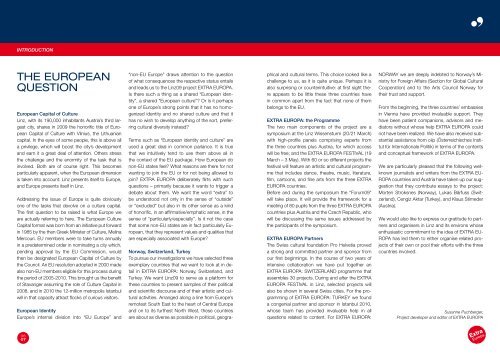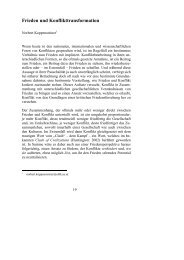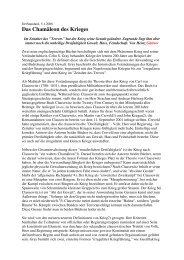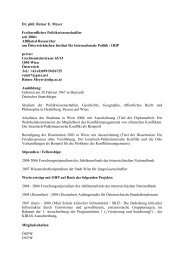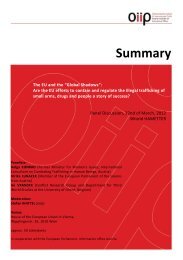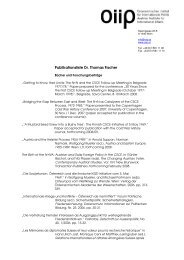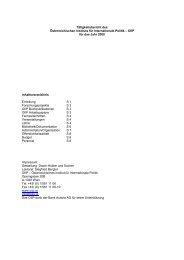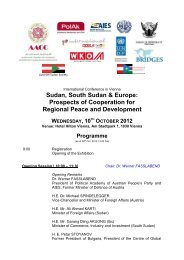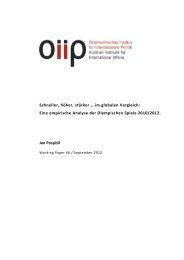Untitled - Oiip
Untitled - Oiip
Untitled - Oiip
You also want an ePaper? Increase the reach of your titles
YUMPU automatically turns print PDFs into web optimized ePapers that Google loves.
introduction<br />
The european<br />
Question<br />
European Capital of Culture<br />
Linz, with its 190,000 inhabitants Austria’s third largest<br />
city, shares in 2009 the honorific title of European<br />
Capital of Culture with Vilnius, the Lithuanian<br />
capital. In the eyes of some people, this is above all<br />
a privilege, which will boost the city’s development<br />
and earn it a great deal of attention. Others stress<br />
the challenge and the enormity of the task that is<br />
involved. Both are of course right. This becomes<br />
particularly apparent, when the European dimension<br />
is taken into account: Linz presents itself to Europe,<br />
and Europe presents itself in Linz.<br />
Addressing the issue of Europe is quite obviously<br />
one of the tasks that devolve on a culture capital.<br />
The first question to be raised is what Europe we<br />
are actually referring to here. The European Culture<br />
Capital format was born from an initiative put forward<br />
in 1985 by the then Greek Minister of Culture, Melina<br />
Mercouri. EU members were to take turns annually<br />
in a predetermined order in nominating a city which,<br />
pending approval by the EU Commission, would<br />
then be designated European Capital of Culture by<br />
the Council. An EU resolution adopted in 2000 made<br />
also non-EU members eligible for this process during<br />
the period of 2005-2010. This brought us the benefit<br />
of Stavanger assuming the role of Culture Capital in<br />
2008, and in 2010 the 12-million metropolis Istanbul<br />
will in that capacity attract flocks of curious visitors.<br />
European Identity<br />
Europe’s internal division into “EU Europe” and<br />
“non-EU Europe” draws attention to the question<br />
of what consequences the respective status entails<br />
and leads us to the Linz09 project EXTRA EUROPA.<br />
Is there such a thing as a shared “European identity”,<br />
a shared “European culture”? Or is it perhaps<br />
one of Europe’s strong points that it has no homogenized<br />
identity and no shared culture and that it<br />
has no wish to develop anything of the sort, preferring<br />
cultural diversity instead?<br />
Terms such as “European identity and culture” are<br />
used a great deal in common parlance. It is true<br />
that we intuitively tend to use them above all in<br />
the context of the EU package. How European do<br />
non-EU states feel? What reasons are there for not<br />
wanting to join the EU or for not being allowed to<br />
join? EXTRA EUROPA deliberately flirts with such<br />
questions – primarily because it wants to trigger a<br />
debate about them. We want the word “extra” to<br />
be understood not only in the sense of “outside”<br />
or “excluded” but also in its other sense as a kind<br />
of honorific, in an affirmative/emphatic sense, in the<br />
sense of “particularly/especially”. Is it not the case<br />
that some non-EU states are in fact particularly European,<br />
that they represent values and qualities that<br />
are especially associated with Europe?<br />
Norway, Switzerland, Turkey<br />
To pursue our investigations we have selected three<br />
exemplary countries that we want to look at in detail<br />
in EXTRA EUROPA: Norway, Switzerland, and<br />
Turkey. We want Linz09 to serve as a platform for<br />
these countries to present samples of their political<br />
and scientific discourse and of their artistic and cultural<br />
activities. Arranged along a line from Europe’s<br />
remotest South East to the heart of Central Europe<br />
and on to its furthest North West, these countries<br />
are about as diverse as possible in political, geographical<br />
and cultural terms. This choice looked like a<br />
challenge to us, as it is quite unique. Perhaps it is<br />
also surprising or counterintuitive: at first sight there<br />
appears to be little these three countries have<br />
in common apart from the fact that none of them<br />
belongs to the EU.<br />
EXTRA EUROPA: the Programme<br />
The two main components of the project are a<br />
symposium at the Linz Wissensturm (20/21 March)<br />
with high-profile panels comprising experts from<br />
the three countries plus Austria, for which access<br />
will be free; and the EXTRA EUROPA FESTIVAL (19<br />
March – 3 May). With 60 or so different projects the<br />
festival will feature an artistic and cultural programme<br />
that includes dance, theatre, music, literature,<br />
film, cartoons, and fine arts from the three EXTRA<br />
EUROPA countries.<br />
Before and during the symposium the “Forum09”<br />
will take place. It will provide the framework for a<br />
meeting of 80 pupils from the three EXTRA EUROPA<br />
countries plus Austria and the Czech Republic, who<br />
will be discussing the same issues addressed by<br />
the participants of the symposium.<br />
EXTRA EUROPA Partners<br />
The Swiss cultural foundation Pro Helvetia proved<br />
a strong and committed partner and sponsor from<br />
our first beginnings. In the course of two years of<br />
intensive collaboration we have put together an<br />
EXTRA EUROPA: SWITZERLAND programme that<br />
assembles 30 projects. During and after the EXTRA<br />
EUROPA FESTIVAL in Linz, selected projects will<br />
also be shown in several Swiss cities. For the programming<br />
of EXTRA EUROPA: TURKEY we found<br />
a congenial partner and sponsor in Istanbul 2010,<br />
whose team has provided invaluable help in all<br />
questions related to content. For EXTRA EUROPA:<br />
NORWAY we are deeply indebted to Norway’s Ministry<br />
for Foreign Affairs (Section for Global Cultural<br />
Cooperation) and to the Arts Council Norway for<br />
their trust and support.<br />
From the beginning, the three countries’ embassies<br />
in Vienna have provided invaluable support. They<br />
have been patient companions, advisors and mediators<br />
without whose help EXTRA EUROPA could<br />
not have been realized. We have also received substantial<br />
assistance from oiip (Österreichisches Institut<br />
für Internationale Politik) in terms of the contents<br />
and conceptual framework of EXTRA EUROPA.<br />
We are particularly pleased that the following wellknown<br />
journalists and writers from the EXTRA EU-<br />
ROPA countries and Austria have taken up our suggestion<br />
that they contribute essays to the project:<br />
Morten Stroksnes (Norway), Lukas Bärfuss (Switzerland),<br />
Cengiz Aktar (Turkey), and Klaus Stimeder<br />
(Austria).<br />
We would also like to express our gratitude to partners<br />
and organisers in Linz and its environs whose<br />
enthusiastic commitment to the idea of EXTRA EU-<br />
ROPA has led them to either organise related projects<br />
of their own or pool their efforts with the three<br />
countries involved.<br />
Susanne Puchberger,<br />
Project developer and editor of EXTRA EUROPA<br />
06<br />
07


